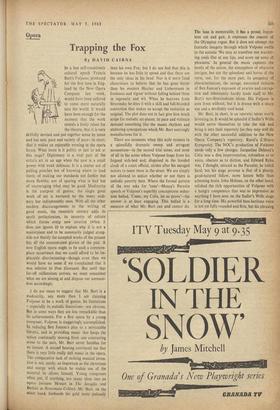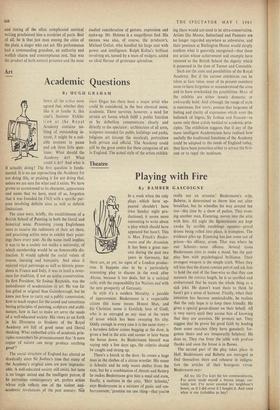O p era
Trapping the Fox
By DAVI I) CAIRNS IN a less self-consciously cultural epoch Francis Burt's Volpone, produced for the first time in Eng- land by the New Opera Company last week, would have been suffered to come more naturally into the world. It would have been enough for the moment that the work reveals a lively talent for the theatre, that it is very skilfully devised and put together scene by scene and has zest, pace and variety of pace—in short. that it makes an enjoyable evening in the opera house. What more is it politic or just to ask at this stage? Diplomacy is a vital part of the critic's art in an age when the new is a small power with weak defences. It is a matter not of pulling punches but of knowing where to land them; of making our standards not feebler but more flexible; not of sparing what is bad but of encouraging what may be good. Mediocrity is the compost of genius; the single great work of art is nurtured by the many ordi- nary but indispensable ones. With all the other modern discouragements to the writing of good music, the twentieth century adds its spoilt perfectionism, its intensity of culture which forces every new creation (when it does not ignore it) to explain why it is not a masterpiece and to be summarily judged along- side not therely the accepted works of the present but all the concentrated glories of the past. A new English opera ought to be such a common- place occurrence that we could afford to be im- placably discriminating—though even then we would have no sense if we complained that it was inferior to Don Giovanni. But until that far-off millennium arrives, we must remember what we are aiming at and dispose our ammuni- tion accordingly.
1 do not mean to suggest that Mr. Burt is a mediocrity, any more than I am claiming Volpone to be a work of genius. Its limitations —especially its melodic limitations—are obvious. But in some ways they are less remarkable than its achievements. For a first opera by a young composer, Volpone is staggeringly accomplished. In reducing Ben Jonson's play to a serviceable libretto, and in providing music that keeps the action continually moving from one contrasting scene to the next, Mr. Burt never fumbles for an instant. A second hearing convinced me that there is very little really dull music in the opera. The comparative lack of striking musical inven- tion is not, surely, as important as the cleverness and energy with which he makes use of the material he allows himself. Young composers often put, if anything, too many ideas into an opera (witness Mozart in The Seraglio and Berloiz in Benvenuto Cellini). Mr. Burt, on the other hand, husbands his gold more jealously than his own Fox; but I do not feel that this is because he has little to spend and that these are the only ideas in his head. Nor is it mere fond chauvinism to believe that he has gone better than his masters Blacher and Liebermann in freshness and vigour without falling behind them in ingenuity and wit. When he borrows from Stravinsky he does it with a skill and full-blooded conviction that makes us accept the imitation as original. The plot does not in fact give him much scope for melodic set-pieces; its pace and violence demand something like the manic rhythms and stuttering syncopations which Mr. Burt untiringly manufactures for it.
There are moments when this style mounts to a splendidly dramatic sweep and arrogant momentum—in the second trial scene, and most of all in the scene where Volpone leaps from his feigned sick-bed and, disguised in the hooded cloak of a court official, strides after his enraged suitors to taunt them in the street. We are simply not allowed to notice whether or not there is melodic poverty here. Where the formal pattern of the text asks for `tune'—Mosca's Parasite speech or Volpone's superbly concupiscent seduc- tion ballad, 'Come, my Celia, let us prove'the answer is at least engaging. This ballad is a measure of what Mr. Burt can and cannot do. The (tine is memorable; it has a proud, imper- ious cut and gait; it expresses the conceit of the Olympian rogue. But it does not attempt the fantastic imagery through which Volpone swells to the ecstatic 'We may so transfuse our wander- ing souls Out at our lips, and score up sums of pleasures.' In general the music captures the bustle of the action, the atmosphere of obsessive intrigue, but not the splendour and havoc of the verse, nor, for the most part, its pungency of characterisation; the savage, encrusted richness of Ben Jonson's exposure of avarice and corrup- tion and inhumanity hardly lends itself to Mr. Burt's neo-Stravinskiam idiom. His Volpone is seen from without; but it is drawn with a sharp eye and a devilishly cool hand.
Mr. Burt, in short, is an operatic talent worth investing in. It would be splendid if Sadler's Wells would nerve themselves to take the risk and bring it into their repertory (as they may well do with the other successful addition to the New Opera Company's repertory, Ravel's L'Heure Espagnole). The NOC's production of Volpone needs only a few changes. Jacqueline Delman's Celia was a dim impersonation, colourless as to voice, obscure as to diction, and Edward Bytes was, I thought, miscast as the Parasite; he toiled hard, but his stage persona is that of a plump, good-natured fellow, more honest belly than scheming brain. John Holmes, on the other hand, relished the rich opportunities of Volpone with a hungry competence that was as impressive as anything 1 have seen on the Sadler's Wells stage for a long time. His powerful bass-baritone voice is not yet fully rounded and firm, but his phrasing and timing of the often complicated metrical writing proclaimed him a musician of parts. Best of all, he is that just man among the cities of the plain, a singer who can act. His performance had a commanding grandeur, an authority and wolfish charm and contemptuous zest, that was the product of both natural presence and the most studied consideration of gesture, expression and make-up. Mr. Holmes is a magnificent find. His success was also, of course, the producer's, Michael Geliot, who handled his large cast with power and intelligence. Ralph Koltai's brilliant revolving set, turned by a team of midgets, added an ideal flavour of grotesque splendour.







































 Previous page
Previous page